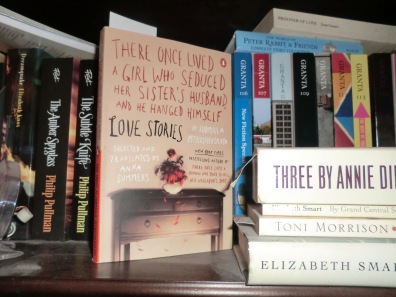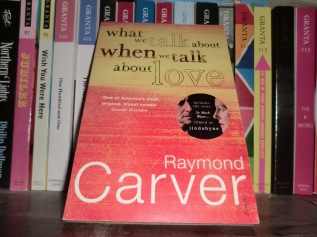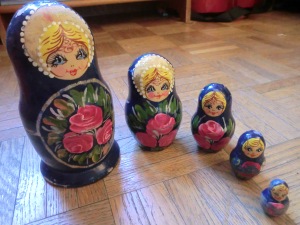 There Once Lived A Girl Who Seduced Her Sister’s Husband, And He Hanged Himself. The title itself is intriguing, though if you have read the author before, you will recognise the tendency, she is the bestselling author of There Once Lived A Woman Who Tried To Kill Her Neighbour’s Baby.
There Once Lived A Girl Who Seduced Her Sister’s Husband, And He Hanged Himself. The title itself is intriguing, though if you have read the author before, you will recognise the tendency, she is the bestselling author of There Once Lived A Woman Who Tried To Kill Her Neighbour’s Baby.
I took the book with me on a recent visit to London, as my alternative to the kindle, since I have been caught out a couple of times with that little machine dying on me even though the battery wasn’t run down. I have since discovered the 20 second rule. When the kindle fails to come to life when it should, hold it in the on position for 20 seconds to reboot it. Like many gadgets today I’m not sure these things are designed to last, not as long an old-fashioned book anyway. And I have Penguin to thank for sending me a bona-fide book!
The blurbs quote Chekov, Poe, Beckett, Tolstoy and various others to entice you in, making promises that will no doubt encourage dissent; it is a tall order to be compared to literary greats. I haven’t read all those greats, but there is one collection I am reminded of, not because she writes like him, but because the voice is clear from story to story and at the end I am left with the notion that “there is consistency in that voice” and “she says it how it is”.
 If Ludmilla Petrushevskaya reminds me of any writer, it is Raymond Carver and his collection what we talk about when we talk about love. Ironically, when pulling this volume off the shelf, I also find tucked in its last page, a boarding card for a flight from Marseille to London, dated June 2008.
If Ludmilla Petrushevskaya reminds me of any writer, it is Raymond Carver and his collection what we talk about when we talk about love. Ironically, when pulling this volume off the shelf, I also find tucked in its last page, a boarding card for a flight from Marseille to London, dated June 2008.
So back to the book.
Seventeen episodes of attempts at love or connection with another, in all their dysfunction, set within the context of post revolutionary Russia when private ownership of housing was forbidden and many family apartments were divided and sub-divided and the space people came to occupy diminished, along with many of their hopes and expectations of each other.
By 1972, when Petrushevskaya published her first story, Moscow was ringed with concrete buildings containing these overcrowded units where the majority of these love stories take place.
Born in 1938 in Moscow, Ludmilla Petrushevskaya never knew family life. Evacuated with her mother to Kuibyshev during the war, she was left there in the care of her aunt and grandmother while her mother returned to Moscow to attend college. Members of the family of “an enemy of the people”, they were treated as pariahs – and were slowly starving. At age eight, Petrushevskaya began to run away from her temporary home and spend summers as a street beggar. Her mother returned after four years and brought her back to Moscow, where they were officially homeless. As a young girl there, Petrushevskaya and her mother lived under a desk in her insane grandfather’s room, while occasionally renting cots in nearby communal apartments. It was an unsettled, unhappy childhood, one experienced without the consolation of siblings.” Extract from Introduction by translator Anna Summers
The stories are collected into four sections, the first A Murky Fate contains stories of characters who consider entering relationships that are flawed or doomed, in readiness for a chance at that diminished flutter of something that may resemble love. It is not to be moved by these circumstances that we read these stories, it is to bear witness to another’s reality. They are uncomfortable, fatalistic and near-true.
She’ll wait for his long-distance call in a phone booth at the post office. For ten prepaid minutes they’ll become one soul again, as they did over the twenty-four prepaid days of their vacation. They’ll shout and cry across thousands of miles, deceived by the promise of eternal summer, seduced and abandoned.
As we read the stories, our own expectations are so low for these women, that it is possible to experience our own small pleasure in expecting nothing and finding delight in an obscure change in their fortune, even if only for a short period.
I mentioned to a friend that it was as if I was sitting across the table from the writer listening to an oral narration of people she knew, that it reminded me of other tables I have sat at, listening to stories of other women from different cultures and how they found themselves living in this or that country or city, so often lead by the allure of love or the promise of an improved lifestyle.
 Each community, era, culture has its stories to share, it disappointments to shed and its eternal hope for future generations, that they may do better. Reading these stories is like reading another chapter in the evolution of humanity and reminds us that we have a long way to go before arriving near any kind of nirvana.
Each community, era, culture has its stories to share, it disappointments to shed and its eternal hope for future generations, that they may do better. Reading these stories is like reading another chapter in the evolution of humanity and reminds us that we have a long way to go before arriving near any kind of nirvana.
…the day is burning its last, and Milgrom, eternal Milgrom, sits in her little pensioner’s room like a guard at the museum of her own life, where there is nothing at all but a timid love.
Note: This book was kindly made available by the publisher.

Given the time period, I can only imagine. I’m quite sure it was not a pleasant time, but we tend to be rather resilient creatures.
LikeLike
I’m not sure things are so different today, I hear stories from women my age that sound like they come from another era, like some kind of deja vu. Not just resilient but opportunistic, survivors in spite of everything.
LikeLike
What an intriguing title! And review. will be picking this one up!
LikeLike
Her book titles are legendary, I’m only just discovering her work, but loving the titles and see how they draw readers in. Many of them are very short, though equally thought-provoking. It’s a collection that invites discussion, as evidenced by some of the other reviews.
LikeLike
I wish I could have felt for it what you felt Claire. I agree that she is a strong writer, writing the truth. Were I using it as source material for a Soviet studies class, it would be a jewel. But I wanted an emotional connection that I never felt.
One thing is for sure though, I’ve loved to hear the views of other readers like you and Cassie. Those reflections have definitely enhanced my reading experience.
LikeLike
You’re so right Alena, often when I am unsure about a book, it is the subsequent discussions that bring it out, I am enjoying the varying perspectives on this one. I am sure that what we bring to the reading also has a significant impact on how we receive it. I like that we are finally hearing the voice of a woman who has been hushed for many years, despite the discomfort she brings.
LikeLike
It rather like appreciating Salinger for giving voice to angry youth even though I really didn’t like Catcher in the Rye. There’s a fine line between appreciating a work of fiction and liking it.
LikeLike
Intriguing review, Claire. 🙂
LikeLike
Thank you Celestine, intriguing stories and an original title!
LikeLike
Sounds like a fascinating read. I’m going to have to find this book for myself. (And I hate it when my kindle dies on me in the middle of book, it seems cruel and unfair, they need to figure out a way to keep that from happening).
LikeLike
These stories certainly make us appreciate whatever we have and they are fascinating in that many of them are derived from experiences of people she knew, something that wasn’t appreciated at the time of writing, but serves as a witness to those times and people.
LikeLike
I will add this one to my list. It sounds intriguing and fascinating.
LikeLike
I just read a great review at the NYT here too.
LikeLike
Great post! I have this book by my bedside and can’t wait to read it!
LikeLike
Thanks very much Claire for retweeting my enthusiasm for Petrushevskaya’s return! I’m awfully excited to see someone else caught the Carver connection – sign of a worldly reader with a great ear 🙂
Do consider pitching @bookriot, @vol1brooklyn, even @nytimesbooks itself. I’d read anything you reviewed.
Warmly,
-Fran xx
LikeLike
I can never bear the suspense and the misery of these threatened deprived Russian lives of that time… have just finished reading a friend’s grandmother’s account she’s had printed herself – they all sound the same, these stories of fear, bullying and hunger…this one had fled the Crimea, went to Shanghai, just survived during the Japanese occupation and ended up here..
LikeLike
I agree Valerie, we like to see our light at the end of the tunnel, Petrushevskaya’s light is a faint glimmer, but enough to grab hold of and use our own imagination to hope for the rest. We think those are past times, but in many countries today, it remains the norm sadly, much for us to be appreciative of, that we haven’t had to live through such despair. Your friend’s grandmother’s story sounds incredible, like a cat with many lives, finally finding the cream downunder I hope.
LikeLike
Fantastic post. Came here from Cassie’s blog.
Love the excerpt you posted.
Must. read. book. now.
LikeLike
You have to love her titles . . . And the glimpses I’ve gotten of her work only make me want to read more. btw, Claire, you’ve hooked me on Mslexia. -)
LikeLike
There is something memorable about certain of these long titles, even Murakami loans the formula from Carver in his non-fiction novella What I Talk About When I Talk About Running.
So happy to hear you are enjoying Mslexia, it really is an off-screen gem full of inspiring small successes, opportunities and proof that anyone can do it with perseverance. I hope you are entering the short story competition!
LikeLike
Lovely titles coming out, long ones like poems! Thank you Claire….
LikeLike
I read There Once Lived A Woman and found it excellently written but rather too unrelenting for me, I’m glad they’re putting more of her stories into English though I would eventually like to brave more of them!
LikeLike
Great post with a new title for me!
LikeLike
Pingback: The Art of the Short Story | alenaslife
Pingback: The Kindness of Enemies by Leila Aboulela (2015) – Word by Word